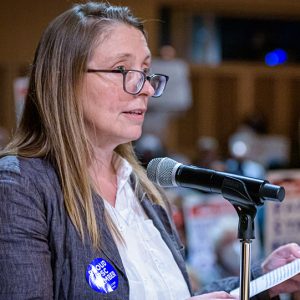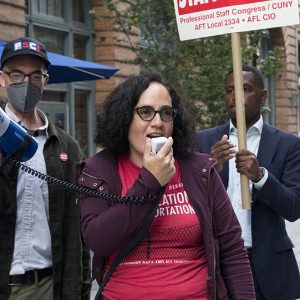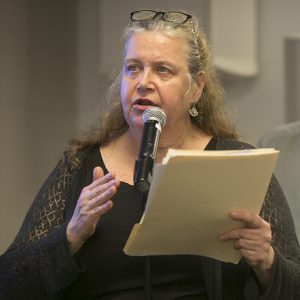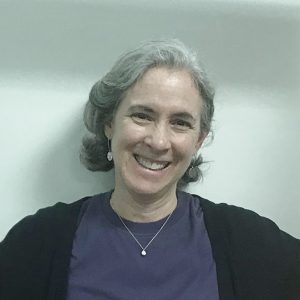On Monday, March 20, 2023, PSC members testified in-person, pressing the Trustees and management to come to the table and bargain a fair contract with real raises. They opposed planned tuition hikes and spoke out against management’s $100 million in college “savings targets” (i.e., cuts to academics and student services).
Below is PSC testimony by PSC members.
Testimony from Board of Trustees Brooklyn Borough Hearing, March 20, 2023

James Davis, PSC President: You heard from 164 chairs of academic departments in their letter of March 12; because of the [Vacancy Review Board], they “feel disrespected and discounted by people whose role should be inspirational and visionary.” As they continued, “We need and deserve an administration that works collaboratively and shares in the sacrifices it imposes on others. We need and deserve an administration that shows respect for us and our efforts to serve our students and community. Academic hiring decisions are the purview of the colleges.” (Read James Davis’ full testimony)

Penny Lewis, PSC Secretary: But our objection also stems from deeper, core questions and problems that we foresee. CUNY’s mission is to provide high-quality education to the people of New York. From what we see in the RFP, and what we hear from CUNY, CUNY Online is ill-conceived and will undermine our core mission, and the university itself. (Read Penny Lewis’ full testimony)

Remi Alapo, BMCC and York: To enhance the quality of student experience and increase student retention and graduation rates, CUNY must substantially increase the number of full-time faculty and better compensate its adjunct faculty. The New Deal for CUNY would lift the ratio of full-time faculty to undergraduate students and close the equity gap between full-time and part-time salaries, prorated per course. The CUNY Board of Trustees has the power to make the “New Deal 4 CUNY” a priority agenda and demand fixing the higher education system in New York City. (Read Remi Alapo’s full testimony)

Carolina Bank Munoz, Brooklyn College Chapter Chair: The blame for these conditions falls squarely on the shoulders of the CUNY administration and the Board of Trustees. If CUNY is undergoing a financial crisis, why did the board approve 30% wage increases for administrators on Executive Compensation Plans? Why are the much-needed pandemic relief funds being used to fund CUNY online, instead of making upgrades to infrastructure on the campuses? If there is an enrollment crisis, why is the CUNY administration supporting tuition increases? The best way out of this crisis is FREE Tuition. (Read Carolina Bank Munoz’s full testimony)

Holly Clarke, John Jay College: Cutting the adjunct budget means laying off seasoned faculty (adjunct faculty) who are valued by their students, their departments and their colleges. The mandated reductions are large. Many of the adjunct faculty, who will lose courses and income or be laid-off altogether (likely 500 to 1,000 faculty), have taught for years in their departments. They have experience with our CUNY students and often teach introductory and lower level courses—courses that are key to student retention. They are not disposable or easily replaceable. This lack of thought regarding the contribution adjunct faculty make to every major across CUNY and their value in student retention is a glaring oversight. (Read Holly Clarke’s full testimony)

David Gerwin, Queens College Chapter Chair: What will happen to students in my department? They will have no courses. They will have to go elsewhere, find other majors for graduation, or wait a year. So my registration will plummet. And because my department graduates and recommends for certification desperately needed middle and high school public school teachers, these delays will hurt the local schools where Queens College is trying to recruit. Governor Hochul can then point at Queens College and say, “Look, their registration is dropping, why fund them?” (Read David Gerwin’s full testimony)

Carole Harris, New York City College of Technology Chapter Chair: We know that all CUNY students need vital support in the areas of Academic Advisement, student Affairs, Financial Aid, Registration, Counseling, etc. Yet, at City Tech, the lack of staffing necessary to provide adequate student support is an especially acute issue: for at least a decade City Tech has had among the lowest ratios of HEOs to students of all the CUNY campuses. Our students deserve better. (Read Carole Harris’s full testimony)

Elizabeth Hovey, John Jay College Chapter Co-Chair: I truly believe that you want our students to succeed, you want them to stay in school, you want them to graduate. I think you want to do that at the least possible cost. You do not know what is being sacrificed. (Read Elizabeth Hovey’s full testimony)

Lynne Turner, PSC VP for Part-time Personnel: Be bold instead. Say not to austerity cuts. No layoffs, no loss of health insurance, no increased workload, and increased class size. Fulfill your mandate to protect and preserve the historic mission of CUNY to serve the working-class communities of New York City. Press for the robust funding we need from the State and now the City. And come to the table to bargain a fair contract with the PSC. (Read Lynne Turner’s full testimony)

Zoe Hu, Graduate Center Chapter Chair: I see first hand the toll that my colleagues experience as they attempt to teach and research on scant wages. They have faced evictions and food insecurity; they are working multiple full-time jobs. Having seen what I have, it does not surprise me that the median time to degree at CUNY, according to its own data, is between 6.3 and 8 years, depending on the cohort. I know for some it can be 9 or 10. (Read Zoe Hu’s full testimony)
Katie Albany, PSC Adjunct Liaison: I’m sure CUNY wants to hire the best faculty even for part-time positions. If CUNY can’t keep up with the competition, the best qualified candidates will choose to work for SUNY instead of CUNY. This has a direct impact on the students and quality of the education they receive. (Read Katie Albany’s full testimony)
Jack Kenigsberg, Hunter College: Realistically, if our [non-teaching adjunct and college assistant] budget is not increased, our only other option would be to try to reduce our administrative costs. We have two CAs, paid at a higher rate than our tutors, who help us administer the [writing center]. We need their help because, as I mentioned before, both I and our associate director are part time; our writing center no longer has even a single full time staff member. We could cut our administrative college assistants’ hours, but if we did that, we would have to cut our operational hours because we can’t leave the center unsupervised. (Read Jack Kenigsberg’s full testimony)

